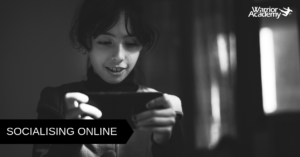
Young people do a huge amount of their socialising online, what effect does this have?
With instant communication with a far broader network of peers available to us through social media, we now do a huge amount of our socialising online.
A study conducted online for “Yazino” found that one in four people spend more time socializing online, via sites such as Facebook and Twitter than they do in person.
“Communication is constantly evolving. Some people are as used to seeing their friends’ online avatar as they are their face,” Yazino founder Hussein Chahine said in The Telegraph. “People increasingly prefer quick and frequent engagement with instant updates on news than a prolonged chat and are also finding new ways to catch up with friends from the comfort of their sofa.”
“The average online Brit spends 4.6 hours a week talking to friends online and only six hours a week talking to people in person”, said Yazino.
http://www.telegraph.co.uk/news/newstopics/howaboutthat/8115578/One-in-four-socialises-more-online-than-in-person.html
Online socialising has had a profound effect on how people interact, while we can now keep in touch and keep up to date with distant friends when we otherwise wouldn’t, “Social media technology” are now platforms to put forward a beautiful display of your life in its greatest light which can create an incorrect reflection of the reality.
What does this do for a young person’s reflection of themselves and their perceived self-worth and ultimately their self-esteem and confidence? How does this affect their values and the decisions they make?
“People tend to want to show others that they are having fun than actually having fun themselves,” said University of South Florida graduate Mark Clennon.
“There’s a greater desire to share with other people you barely know, than actually hanging out with friends and making memories,” he added.
The largest social media network is Facebook. Now, as I write this Facebook approaches 2 billion monthly users, its CEO Mark Zuckerberg revealed a new mission statement, to “Give people the power to build community and bring the world closer together.”
More people around the world are connected through Facebook than any other Social Media platform. Instant communication, the sharing of ideas and information, a huge support network of close friends and the ability to stay in touch with long lost friends/relatives are all huge benefits of technology that provides us with the tools to socialise online.
With a huge amount of young people doing the majority of their socialising online what are the drawbacks? If online socialising is replacing in-person socialising, what effect does this have on developing their social skills, body language, and ability to build rapport in person?
The rise in cyberbullying is a hugely negative influence presented by the increase in socialising online through social media. It’s far easier to bully others through social media than in person and the impact can be devastating. Students with disabilities are often a target of prejudice and this is carried on in their face to face interaction.
Productivity levels shoot down due to the increased distractions caused by social media and this has a huge effect on schoolwork, grades and studying.
Social skills are destroyed, the virtual world is full of outspoken young people who are more reserved in face to face interactions. The important skills in communication learnt through regularly in-person practice are not developed and this has a huge effect on everything we do from developing friendships, relationships or even attending interviews or presenting ourselves in person.
Socialising online can also lead to the disclosing of far too much information, it’s easier and feels safer to disclose information online rather than face to face and this can create a whole host of problems and is a cause of concern for the safety of young people.
To wrap this up… young people socialise more online now than ever before. It means they are more connected, can express themselves freely and link up with like-minded peers and means they can keep in with friends.
But, the modern problems presented by socialising online are that it also has the power to damage confidence and self-esteem as young people try to keep up with the incorrect reflection of the life their friends have posted. It can affect a person’s ability to socialise and present themselves in person as the basic socialising skills are not learnt or practised regularly. More online socialising also means bullying is more accessible and harder to trace and prevent and the safety of young people can be at risk.
We can’t escape socialising online and we shouldn’t, it can be a fantastic, positive tool but it requires self-discipline and a strong offline community. As we move on, you will find the first step of the Warrior Method; “Community”, provides the framework to solve many of these problems.
Next up in our modern problems series – ACTIVITY LEVELS….
Don’t worry we have solutions waiting for you in our “Ancient solutions” series.

start today!
Call Us Free
07809330576
07809330576
